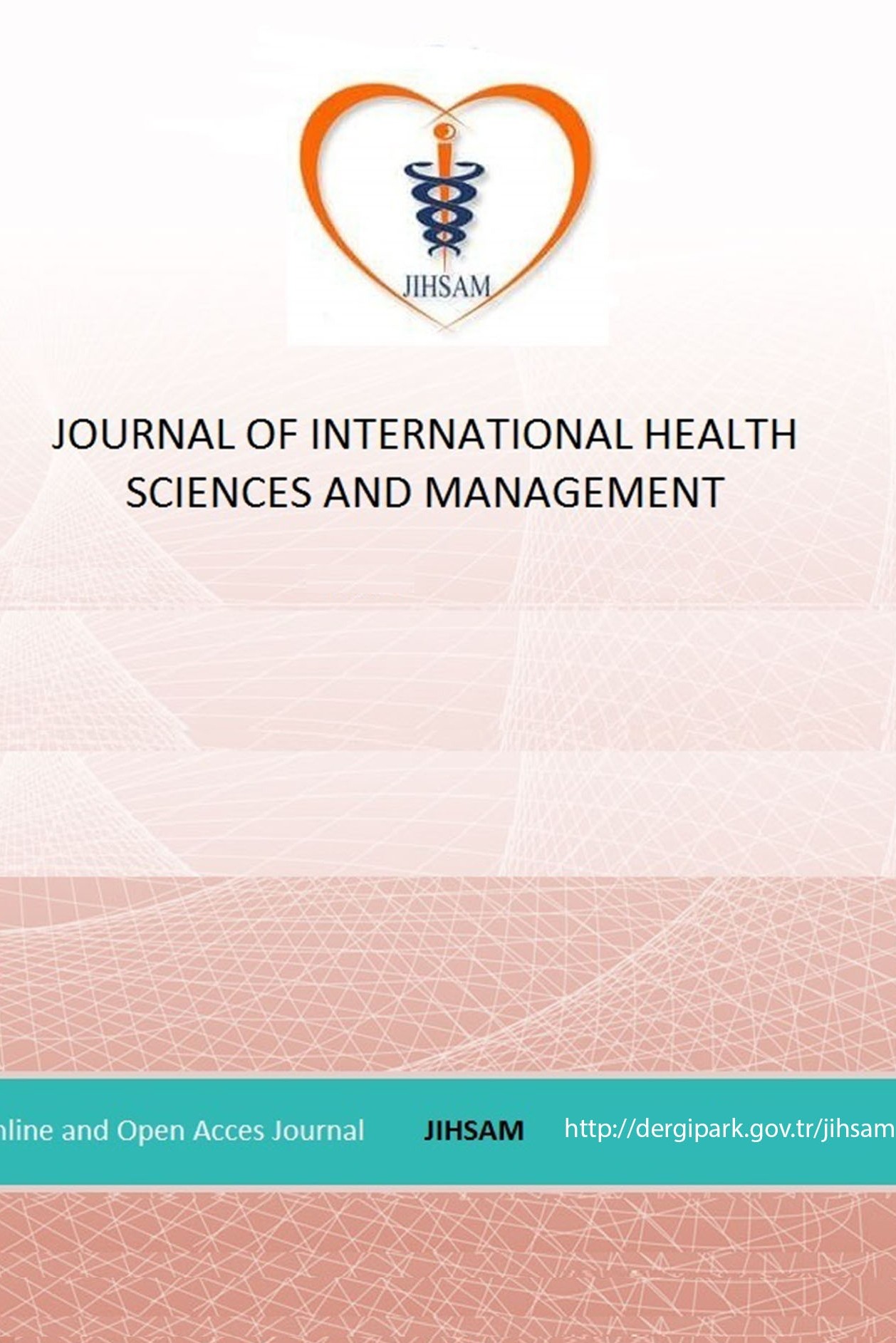A Survey of Knowledge and Practices in Generic Prescribing Among Doctors in Kurunegala District, Sri Lanka
A Survey of Knowledge and Practices in Generic Prescribing Among Doctors in Kurunegala District, Sri Lanka
Generic Prescribing, Knowledge, Practices Doctors, Sri Lanka,
___
- Banahan, B. F. (1997). A Physician Survey on Generic Drugs and Substitution of Critical Dose Medications. Archives of Internal Medicine, 157(18), 2080. https://doi.org/10.1001/archinte.1997.00440390066010
- Carthy, P., Harvey, I., Brawn, R., & Watkins, C. (2000). A study of factors associated with cost and variation in prescribing among GPs. Family Practice, 17(1), 36–41. https://doi.org/10.1093/fampra/17.1.36
- Davies, K. (2007). The information-seeking behaviour of doctors: A review of the evidence. Health Information and Libraries Journal, 24(2), 78–94. https://doi.org/10.1111/j.1471-1842.2007.00713.x
- De Silva, D. (2017). How many doctors should we train for Sri Lanka? System dynamics modelling of training needs. Ceylon Medical Journal, 62(4). Donohue, J. M., Cevasco, M., & Rosenthal, M. B. (2007). A Decade of Direct-to-Consumer Advertising of Prescription Drugs. New England Journal of Medicine, 357(7), 673–681. https://doi.org/10.1056/NEJMsa070502
- Gagne, J. J., Choudhry, N. K., Kesselheim, A. S., Polinski, J. M., Hutchins, D., Matlin, O. S., Brennan, T. A., Avorn, J., & Shrank, W. H. (2014). Comparative Effectiveness of Generic and Brand-Name Statins on Patient Outcomes: A Cohort Study. Annals of Internal Medicine, 161(6), 400. https://doi.org/10.7326/M13-2942
- Jamshed, S. Q., Ibrahim, M. I. M., Hassali, M. A. A., Masood, I., Low, B. Y., Shafie, A. A., & Babar, Z.-U.-D. (2012). Perception and attitude of general practitioners regarding generic medicines in Karachi, Pakistan: A questionnaire based study. Southern Med Review, 5(1), 22–30.
- Keenum, A. J., DeVoe, J. E., Chisolm, D. J., & Wallace, L. S. (2012). Generic medications for you, but brand-name medications for me. Research in Social and Administrative Pharmacy, 8(6), 574–578. https://doi.org/10.1016/j.sapharm.2011.12.004
- Kembhavi, R. S., Shinde, R. R., Hagawane, T., Jadhav, R. A., Khairnar, R. R., & Darade, B. D. (n.d.). Cross Sectional, Observational Study to Assess Prescription Practices of Physicians with Respect to Use of Generic Medicines. International Journal of Pharmaceutical Sciences Review and Research, 25(1), 90–96.
- McCormack, J., & Chmelicek, J. T. (2014). Generic versus brand name: The other drug war. Canadian Family Physician, 60(10), 911.
- Menik, H., Isuru, A., & Sewwandi, S. (2011). A survey: Precepts and practices in drug use indicators at government healthcare facilities: A hospital-based prospective analysis. Journal of Pharmacy and Bioallied Sciences, 3(1), 165. https://doi.org/10.4103/0975-7406.76502
- National Medicines Regulatory Authority Act 2015. (No.5). (2015). Government Publications Bureau.
- Rosenthal, M. B., Berndt, E. R., Donohue, J. M., Frank, R. G., & Epstein, A. M. (2002). Promotion of Prescription Drugs to Consumers. New England Journal of Medicine, 346(7), 498–505. https://doi.org/10.1056/NEJMsa012075
- Schumock, G. T., Walton, S. M., Park, H. Y., Nutescu, E. A., Blackburn, J. C., Finley, J. M., & Lewis, R. K. (2004). Factors that Influence Prescribing Decisions. Annals of Pharmacotherapy, 38(4), 557–562. https://doi.org/10.1345/aph.1D390
- Sharifnia, S. H. A., Mohammadzadeh, M., Arzani, G., Salamzadeh, J., Abolfazli, S. A., Zali, A., & Khoshdel, A. R. (2018). Main Factors Affecting Physicians’ Prescribing Decisions: The Iranian Experience. Iranian Journal of Pharmaceutical Research: IJPR, 17(3), 1105–1115.
- Theodorou, M., Tsiantou, V., Pavlakis, A., Maniadakis, N., Fragoulakis, V., Pavi, E., & Kyriopoulos, J. (2009). Factors influencing prescribing behaviour of physicians in Greece and Cyprus: Results from a questionnaire based survey. BMC Health Services Research, 9(1), 150. https://doi.org/10.1186/1472-6963-9-150
- Vancelik, S., Beyhun, N. E., Acemoglu, H., & Calikoglu, O. (2007). Impact of pharmaceutical promotion on prescribing decisions of general practitioners in Eastern Turkey. BMC Public Health, 7(1), 122. https://doi.org/10.1186/1471-2458-7-122
- Wazana, A. (2000). Physicians and the Pharmaceutical Industry: Is a Gift Ever Just a Gift? JAMA, 283(3), 373. https://doi.org/10.1001/jama.283.3.373
- WHO definitions of generics. (2012). Generics and Biosimilars Inititative. http://gabionline.net/Generics/General/WHO-definitions-of-generics World Health Organization. (2016). WHO Drug Information-Generic medicines.
- Yayın Aralığı: Yılda 2 Sayı
- Başlangıç: 2015
- Yayıncı: Sedat BOSTAN
A Research to Determine the Ethical Climate Perception of Nurses Who Work In Private Hospitals
Emel AVÇİN, Şeyda CAN, Beyza ERKOÇ, Fatma YEŞİL, Gürkan ERDOĞAN
Examining of Health Policy in Rare Diseases in Terms of Historical Perspective in Turkey
Merve Deniz PAK GÜRE, Özgür İNCE
Investigation of Individual Perception and Health Behavior towards Covid-19 Pandemic
Inactive SARS-COV-2 Vaccine Adverse Effects Among Hospital Workers
Esen SAYIN GÜLENSOY, Aycan YÜKSEL, Nalan OGAN, Aslıhan ALHAN, Evrim AKPINAR
Analysis of HIV/AIDS Reports in Turkey from Disaster Management Perspective
Examination of Efficiency Change of Provincial Hospitals in Azerbaijan with Malmquist Index
Fuad SELAMZADE, Oğuzhan YÜKSEL
A.p. MADURAGODA, S.m.n.s.m. MALLAWARACHCHİ
Risk Assessment In a Public University Chemistry Laboratories
Determining the Possible Effect of Diabetes on the Nutritional Status of Hemodialysis Patients
Zehra Margot CELİK, Gul AKDUMAN, Hanife ÖZEN, Şerife DAŞDEMİR, Fatma GÜNEŞ
